Hamish McLachlan: Dennis Cometti as amusing off-air as he is on it
DENNIS Cometti is “The Godfather” of Channel 7 with his voice, his one-liners and his hair. Hamish McLachlan talks to him about his boring the great Richie Benaud and his final call.
VIC News
Don't miss out on the headlines from VIC News. Followed categories will be added to My News.
SOME voices are synonymous with some sports. And some sports are better for some voices. Liggett and cycling. Benaud and cricket. Cometti and football.
Dennis will call his final game for Channel 7 this Saturday, and the football public will be much poorer for it.
Den has been the voice of the AFL since it became a national competition. He’s also made some magnificent Olympic moments even more significant.
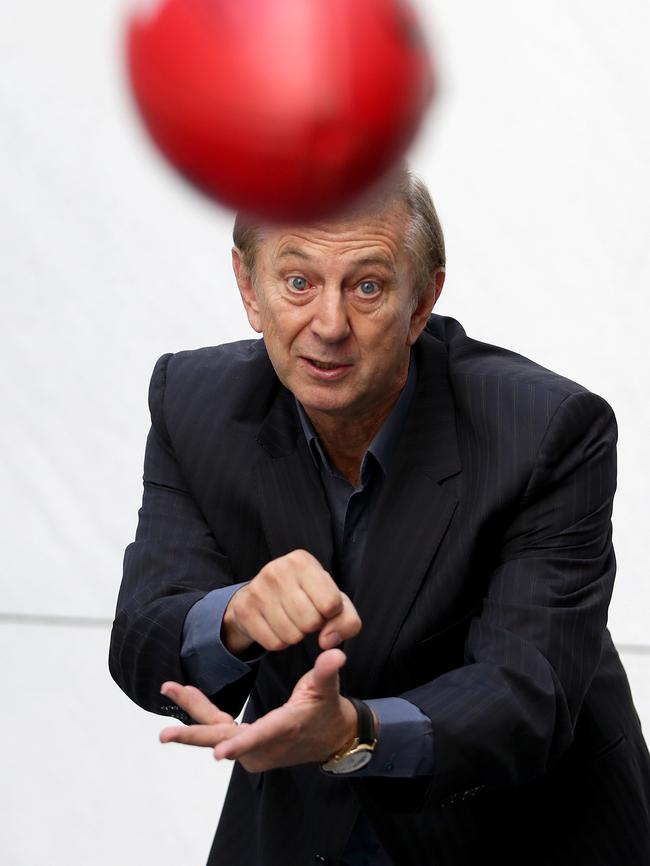
He is the gold standard, and revered by all of us who work with him. He is as amusing off air as he is on it, and is exceptional company.
Dry, sharp, quirky. He is exceptionally generous with his time, and always forthcoming with advice for those of us seeking it.
Den is “The Godfather” of Channel 7. His voice. His one-liners. His hair. We talked about childhood, a promising football career that ended before it hit its straps, the pursuit of a life as a disc jockey, a lucky phone call, Footscray, Polly Farmer, Bruce McAvaney, boring the great Richie Benaud, Peter Tork, coaching, the pressure of calling the Olympics, his favourite line, his hair, and his final call.
HM: Somebody told me you’re retiring. Is that true?
DC: I am. But I’ve made a bad mistake. I should never have announced I was retiring. Almost every conversation I have now is about retirement. As a result, I’m finding retirement very tiring.
HM: There are a lot of us hoping it’s a Johnny Farnham style retirement.
DC: Look, I still love the footy, but it’s the travel I’m retiring from. Besides, if we’re using a musical analogy, I would rather I don’t become Meatloaf!
HM: Our researcher at Channel 7 tells me you’ve spent 7½ years in hotels. That’s a big commitment, especially when you have a young family.
DC: Yes, I’ve been doing it for a long time. I chased my dream and Velia (Den’s wife) has chased after the kids (Ricki and Mark). That seems hardly fair, but after 46 years it still works for us.
HM: With travel come taxis and drivers. Your Melbourne driver, Raj, has become quite famous at Channel 7. Who is your driver in Perth?
DC: For the footy? It’s Vee. She drops me off at Subiaco Oval, and comes and picks me up afterwards. That’s quite romantic in its way, isn’t it?
HM: Very — it’s like something from The Notebook. Let’s go back a little … you were born in Geraldton. What were your parents doing there at the time?
DC: My father worked for the Department of Civil Aviation. He was doing country service, and going to various airports around the state. I just happened to be born there, but we were only there for a few months.
HM: When did you settle in Perth?
DC: I was about four or five years old, just in time to start school.
HM: Your first childhood memory?
DC: I was an only child, but I had an idyllic childhood. My father was very big on sports, and we did a lot of that together. I look back very fondly on those days. I remember going to my first game of football with my dad when I was seven. That’s a standout memory for me.
HM: Why is that?
DC: Probably because I’m mired in the ’50s and ’60s. Too bad you missed them! Anyway, we went to Perth Oval for a game between East Fremantle and East Perth. East Perth was flying high at the time under the influence of Graham Farmer, but I remember spending most of the day searching for empty bottles and cashing them in for the refund. As it turned out, East Fremantle won, so I chose them as my team, which wasn’t a bad choice. They were very successful over the following years, but it was a disaster geographically — Fremantle was 20 miles away!
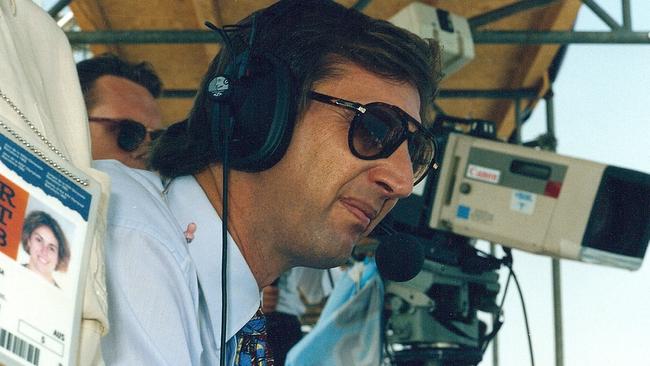
HM: Did your entrepreneurialism with the bottles allow you to fall in love with the game that afternoon?
DC: No, I didn’t see much of the game! But I tell you what, I found the bottle business competitive and very physical. You used to get a penny a bottle!
HM: Sounds a tough racket! You played for West Perth as a 17-year-old in 1967. The next year you kicked over 60 goals when Polly Farmer was coaching. Without too much modesty, what sort of a player were you?
DC: I think a promising one. I know a bit was expected of me, but I only played two seasons, really.
HM: Half-forward, full-forward, “utility”, Carey-esque?
DC: In attack much of the time, but on the ball as well. I’ve spent the last 30 years mocking my own playing and coaching record. I’d appreciate it if you don’t undermine me now! When you sit next to some of the all-time greats, self-deprecating humour is probably the best thing you can do. Are you with me?
HM: I’m with you, Den; it can be intimidating … but seven goals in a half … Polly Farmer said you were a potential champion, and he couldn’t wait for your body to mature. He thought you were going to be one of the best half-forwards in the game.
DC: Polly was great, but you have to remember I paid him to write the foreword for the book you read that in!
HM: He was your coach, but you were closer than just player and coach, weren’t you?
DC: Yes, we were. He was very good to me. I like him very much.
HM: Your football career was much shorter than Polly had hoped.
DC: It was. I had torn my hamstring badly in the 1968 second semi-final against Barry Cable’s team, Perth, and then my father died early in 1969. Fair to say my attention to rehab wasn’t great. I had become a disc jockey, and just met Velia. Polly used to come around home for cups of tea, and his patience and encouragement had me back in the side for the first game in 1969. Unfortunately I broke down during the warm-up — I repeat, the bloody warm-up! Fortunately Vee wasn’t a footy fan. I walked around to her after the game, humbled and limping, and she asked if I had played! That was the moment I knew she was the woman for me.
HM: I can relate to that: last week my wife, Soph, rang me while I was calling a final in Sydney and asked where I was! You’ve spoken about your father passing away. Is it true you found out the bad news during a training session?
DC: Yes, I did. It was preseason, and we were training at West Perth. The previous week we had played North Melbourne in a practice match. I remember a young policeman walked out on to the ground and got razzed by the boys because he said he was looking for me. I think he was almost as young as I was. He came up to me and he told me my father had passed away.
HM: You lost your drive to play the game that afternoon, didn’t you?
DC: Maybe. If nothing else, the great adventure with my dad was over. I might’ve gone to the odd night of training, but often I just wouldn’t turn up. It was a strange time. I’d only just got into radio, and I enjoyed that. It didn’t require the effort that football did, and essentially I just drifted.
HM: Regarding your father Jim, you recently found some footage of yourself sitting alongside your dad as a 15-year-old at the 1964 WAFL Grand Final.
DC: I did. I’d seen vision of the last quarter of that game often, but nothing more. It’s funny the things you remember, and one mundane incident in the game always stayed with me. Fred Lewis, a fine East Fremantle player of the day, tried to recklessly soccer the ball right in front of my dad and I. There was no kicking in danger rule then, and Fred missed the ball and narrowly missed an opponent’s head. Then one grand final marathon night years later, the whole game was shown. And there in the second quarter was Fred still missing the footy, but because it rolled out of bounds, the director took a close-up shot, and there we were sitting in the front row! People of my parent’s generation rarely took photos so it was a good find — in our “natural habitat”, so to speak. I still have the odd “Sunset Boulevard” moment when I dig that old black and white vision out.
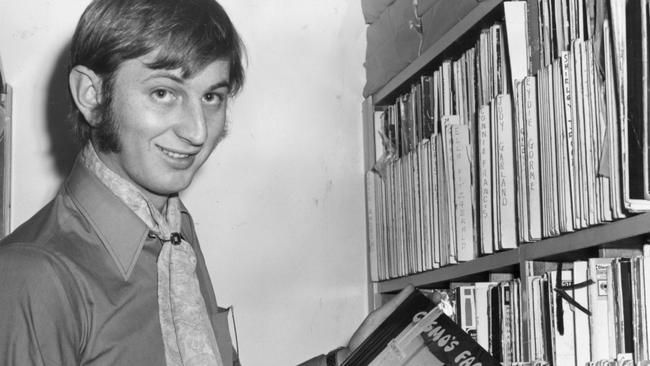
HM: Very special; I’m glad you found it. From footy to the pursuit of a career as a disc jockey. What was it that fascinated you about music and the radio?
DC: I fell in love with the music and the excitement it generated. I also met some of the strangest people in my life doing that job. Radio had reinvented itself to combat TV, and it was riding on the back of The Beatles and The Rolling Stones.
HM: How did you get your first job in Perth on radio?
DC: A network had offered me a country job, but I couldn’t move out of Perth because of the footy. Midway through 1968, the same people offered me a chance in their city station. So I joined 6KY, a Top 40 station.
HM: You had a few stints at a few radio stations, I gather?
DC: It was a very volatile industry back in those days: you got a gold watch for six months service! I got a job at 3DB in Melbourne, and I loved it there. They did the football and the races. It was a very eclectic station, and perfect for me.
HM: You ended up playing some football with the Footscray Reserves during your stint in Melbourne.
DC: I did, although how I got there I’m not quite sure. I didn’t come to Melbourne for football, I came for radio. If you discard my ’69 warm-up fiasco, I hadn’t played at all the previous year. Still, I really enjoyed my time at Footscray and the chance to meet and be coached by Ted Whitten. I started on air at DB every night at 7pm, and would be heading off to work at virtually the same time Ted was heading out on to the track for the start of training. I don’t think he held out much hope things were going to work!
HM: Sounds like that cartoon — one was going, the other always leaving: “Morning Sam” … “Morning Ralph”. You came back to Perth in 1971 still working on radio, and then you had a phone call from Ian Major that really changed your life.
DC: Ian was a much respected broadcaster on 3KZ, a station that had an affiliation to 6KY, and he was looking for someone to help him call a WA v Victoria state game the following Saturday in Perth. He rang the radio station, and I happened to be the only person in the announcer’s room at the time. Ian said he needed another voice to give him “a small breather” and asked whether I could recommend someone. I told him I’d played a bit of footy and I’d be happy to have a go. As it turned out, Ian was very generous and let me do quite a bit of the game, and I came away having really enjoyed the day.
HM: How did you go?
DC: Probably badly, but at the time I thought very well! Unfortunately it was only heard in Melbourne, so I had to do without Vee’s critique!
HM: Did you think at that point calling sport might take over from being a disc jockey?
DC: At that stage I’d worked at about six different stations in two years. It had occurred to me that greater job security might be found somewhere else!
HM: I gather your mother wasn’t quite as into football as your father was?
DC: No, Dulcie was more concerned about my long-term future. She was supportive, but I’m not sure she liked my choices. I had a job with the Postmaster-General’s Department for a while selling stamps, and I packed that in to play footy and get on the radio. And then when I kept spreading my talents up and down the radio dial, she became even more apprehensive.
HM: Your mother passed away in 2002. She would have seen and heard a lot of your work. Did she ever admit that she got it all wrong and tell you how proud she was of you?
DC: Not really, but you had to know my mother to understand. She was a wonderful lady, but very headstrong. She was a very strident woman, and her sister equally so. I’m sure I went to a lot of breastfeeding rallies that I am unaware of!
HM: You are a liberal thinker … it has a beginning. She would have been very proud, I’m sure. How many times have you changed house in your life that you can remember?
DC: None that I can remember.
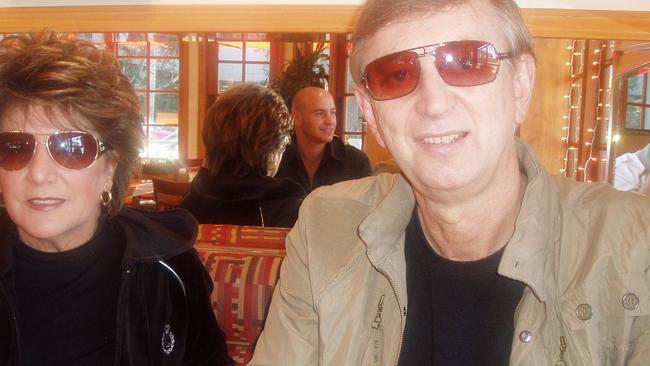
HM: You still live in the same house you grew up in? You must be pretty familiar with the general set-up.
DC: I don’t get lost, if that’s what you’re asking, but we’ve made a few adjustments. Some people change houses a lot, and that may be good, but I haven’t tried it. Mum told me the house was too big for her, and she moved out, and we moved in.
HM: The ultimate first-homeowners’ grant! How did you end up at the ABC on radio?
DC: I got a phone call late in 1973. The ABC in Perth had a vacancy, and they called to ask if I would be interested. I had just finished a season that, through circumstance, had me playing music on weekdays and calling the WAFL at weekends at 6PR. The timing seemed right so I agreed. Dulcie was delighted! And it was there I shared an office with Drew Morphett. Strange how things work out; not long before that I’d been working alongside another great talent, Sandy Roberts, at 6PM in Perth.
HM: A gathering of legends. You did the cricket that summer following the footy?
DC: Yes. I started with Sheffield Shield cricket, and began calling Test matches after Christmas. I’d never done cricket before, but I was a keen follower. I started alongside Alan McGilvray, Lindsay Hassett, and Jim Maxwell. It was great.
HM: You started with royalty. Did you enjoy calling the cricket for the ABC as much as football?
DC: No, I was always a football man. In the mid-’80s, the ABC suggested that I go with Alan McGilvray to England to meet some of the British broadcasters with a view to taking over from him, but I chose to stay to cover the WAFL. It was a decision the ABC was disappointed with, and after 13 years it became clear to me I needed to leave. Mind you, I really enjoyed the cricket because it could be so conversational and entertaining — almost like talkback radio — but when push came to shove it was footy over cricket. Dulcie developed a migraine!
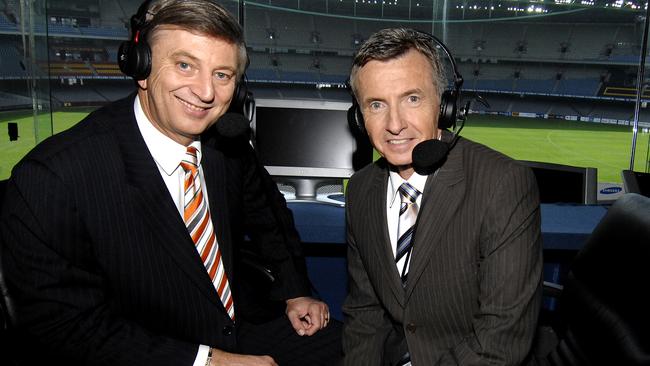
HM: You did make it stressful for your mum. You got to work with the great Richie Benaud during your cricket years?
DC: I did, but it wasn’t until late 1986. When I first went to Channel 7 in Perth for the footy, they were kind enough to let me do the cricket on the Packer-owned network of radio stations headed by 2UE. For a decade, Henry Blofeld and I did the ball-by-ball and got to broadcast with all of the Channel 9 experts. I think they were even better on radio than they were on television as there was more time for them to be expansive, so I think that was the best cricket coverage I was part of.
HM: I’ve been told that one of the only times you’ve ever felt nervous on radio was when you were working with Richie Benaud.
DC: I prefer “apprehensive”, it’s more professional. But it’s true — I idolised Richie growing up. He was one of a kind. He had the buttons undone on the shirt, always tanned, collar up! To me he remains a cross between George Clooney and The Rock when it comes to cool. Although I’m not sure how he felt about me. I do know I put him to sleep one night on air. 2UE had a rather rotund scorer who sat between the two of us, and I remember I had finished espousing a theory of mine, gleaned no doubt from my time as vice-captain of the Green faction at Tuart Hill High School, only to be met by silence. I couldn’t see Richie, so I went through it again. Eventually the scorer started to vibrate and leaned back to reveal my idol fast asleep!
HM: At least he didn’t dismiss your theory … that’s something?
DC: No, but I didn’t run it by him again when he woke up!
HM: How did you end up at Channel 7?
DC: I got a call from Channel 7 just before Christmas ’85 when the ABC was still disenchanted with me.
HM: You keep getting calls!
DC: Very little texting and email back then, but calls were “in”. I had finished coaching West Perth in 1984 and was covering the football for the ABC, something I had continued to do while I was coaching. We were all aware of an impending national competition, and Channel 7 Perth thought they were going to be a part of it and were keen to establish people to do it. I went there in 1986, the year before it all started. We ran into a few snags along the way, because the AFL decided to get an intermediary to sell the television rights. That company was called Broadcom, but Channel 7 Melbourne refused to deal with them. That resulted in the first year of the national competition being covered by the ABC in Melbourne. The rest of the country saw the footy on channels that had purchased the rights from Broadcom. Bob Skilton and I called the 1987 VFL Grand Final, but it wasn’t the coverage seen in Victoria.
HM: Go back a step. In 1982, you were the coaching West Perth, but holding down a fulltime job at the ABC calling the cricket, and the football in the League you were coaching in? That seems extraordinary to me.
DC: It was a bit unusual, I must say, more so for the ABC, but I’m sure they saw the WAFL, even before the Eagles, as small potatoes compared to the Test cricket, and in their eyes they regarded the cricket as my main function. I think we might need a flow chart to follow this soon! Anyway, they let me do the footy. The first year I coached West Perth was 1982. We won the first semi. Clearly I didn’t call that. The following week I had to call the second semi between Claremont and Swan Districts, with the loser to play us (West Perth) in the preliminary final. We had a poor record against Claremont, but a very good one against Swans. It’s fair to say my call of that second semi would rank as my most biased ever, and all to no avail. Swans won, and any chance West Perth had of making the grand final was lost.
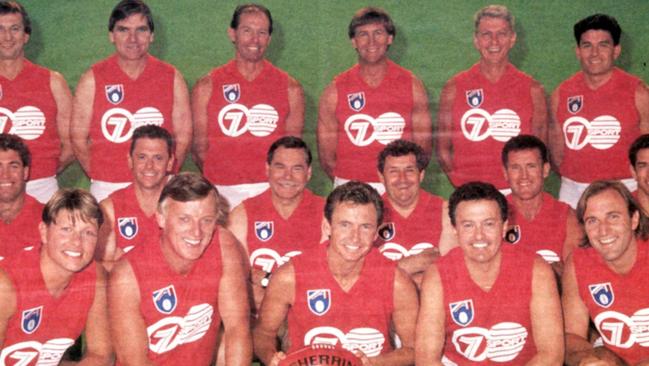
HM: You became one of the voices of Channel 7 and football, but then Seven lost the rights. Was it easy to disappear over the road to Channel 9?
DC: It wasn’t. I was a Seven man at heart. I’d been there over 13 years. But the five years at Channel 9 were very good for me, and I really appreciated Eddie McGuire offering me that opportunity. My role was initially to do Eagles games, and the Friday nights that Eddie didn’t do, which would be Collingwood games. Eddie was going to do the rest alongside Tim Lane. But Tim had a clause in his contract that said he wouldn’t broadcast Collingwood games with Eddie and, subsequently, when Eddie said he was going to do the Collingwood games, Tim pulled out. I was brought in to take Tim’s place, which I’ll admit was a little awkward to begin with. Of course, Channel 7 subsequently got the rights back and I was lucky enough to get back to where I felt most comfortable.
HM: You and Bruce McAvaney — did you think you would work so well together?
DC: It never crossed my mind that we wouldn’t, but I am very pleased with how it has played out. I always had the utmost respect for Bruce. We have never had a harsh word, and as great a broadcaster as Bruce is, he’s an even better bloke. I envy his new Friday night partner, whoever that happens to be. We are poles apart in some regards, and like an old married couple in others. It has been so comfortable and so exciting — words that normally don’t go together — but in our relationship, I’d like to think fit perfectly.
HM: It is hard to articulate to people how good a fella Bruce is. You are some pair. Odd one: I was calling a game earlier this year for Seven when word filtered through to me that Muhammad Ali had passed away. You were doing the same game, but on radio, and I’ve been told you were quite affected by the news. Was he a man that you looked at with great affection?
DC: Yes, he was, for no other reason other than I liked his persona. He was a larger-than-life character, and in many regards he changed the world — certainly the sporting world. He was also part of my youth.
HM: He was a game-changer, and sorely missed. Back to the football: is your weekly preparation and routine fairly regimented?
DC: Very much so. I know what’s coming on any given day of the week; I have a very regimented routine. I enjoy it. I love to sit down and watch the tapes. I will turn the music up and the volume down. It’s a solitude I’ll miss.
HM: Bruce once said to me: “Never try and copy anyone, you will be a poor version of them and not the best version of yourself.” What advice would you give to an aspiring broadcaster?
DC: It’s the originals that generally make it in any field. Failing that, if you want to plagiarise, the world is your oyster right now. People often send me tapes of their commentary and those tapes are almost always a composite of Australian broadcasters I know, or a particular Australian broadcaster I know. My advice in this age of the internet is: “Please at least go offshore.”
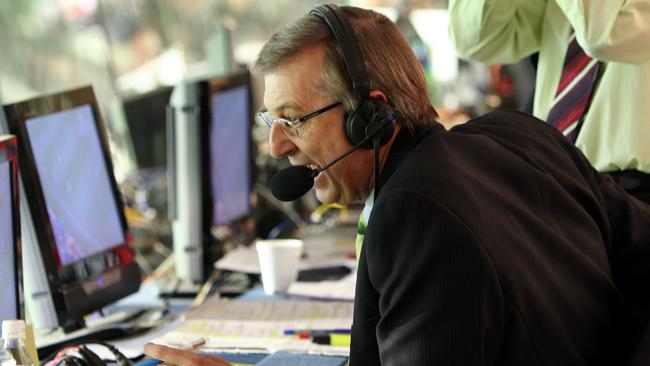
HM: You listen to a lot of American radio, don’t you?
DC: A lot, yes. Music as much as anything else, but I have some favourite sports broadcasters that go back a long way. I greatly admire Vin Scully. He’s still going strong at age 88. He broadcasts Dodgers baseball games alone. He is the eighth wonder of the world. Bruce reminds me of a very youthful Vin Scully.
HM: Which broadcasters influenced your commentary style?
DC: Too many to name. Besides, if you checked them out, you might think I’ve gone offshore! There is a golf guy on CBS by the name of Gary McCord who makes me laugh. He was barred from the Masters because he talked about the greens being so quick it was like they had been “bikini waxed”. Some of those English cricket commentators of yesteryear, like Brian Johnston and John Arlott, had a devilish humour about them too; very understated.
HM: When did you feel like you were comfortable enough to start infusing what have become your legendary lines?
DC: From the start, I guess, and probably it had a bit to do with being a smart alec disc jockey in the early days. Then I found I loved the banter you could have between deliveries broadcasting the cricket.
HM: I’ll come back to the lines. When was the most pressure you ever felt behind a microphone?
DC: Probably the Olympics, simply because they were not the sports that I grew up with. I did swimming, but the only qualification I had was that I had a pool in the backyard! I was always concerned with the terminology. Get the terminology wrong, and the people who know then know you don’t know.
HM: You called at three Olympics. Kieren Perkins in Atlanta was a masterclass in calling: “Great moments in sport come when they are least expected, that’s what makes them great, and we are seeing one now, something out of the box … Kieren Perkins is swimming away from this field … he was down and out yesterday, but suddenly he’s stood up, he wants to be counted … this is gold, rare gold, the best kind of gold.” Do you think that 1500m final is one of your best calls?
DC: I’m probably not the man to ask. I’ve never watched the race back — I’ve seen the finish quite a few times on TV, but I’ve never watched any of those races back, and I’ve never watched any grand finals back. You can’t do anything about them; you go in with the hope and the expectation that you don’t bugger it up. That is the pressure. If an Australian at the Olympics is fancied and wins an event, it will be played for a long time to come. I hated the thought of getting it wrong and my son, my daughter or my wife in a shopping mall years later being embarrassed by a replay on a giant screen.
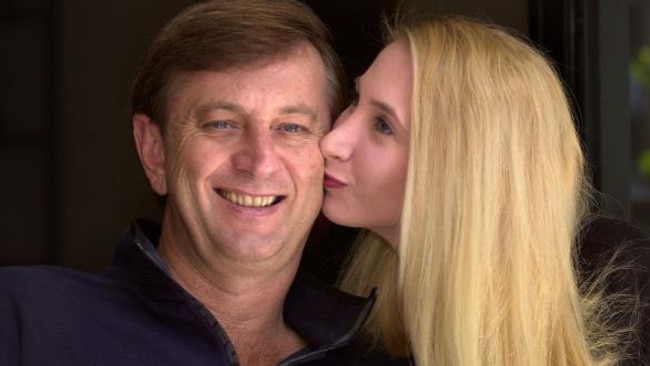
HM: “The heart of a lion in the heart of Dixie”. That is how you described Susie when she won in 1996. It is one of the great lines.
DC: I think it helps if you have something in mind beforehand. I had thought about that line during the day and felt it could fit well enough. The thing about swimming, compared with football, is that in footy the call is so instinctive, it happens so quickly. There is time to think in a swimming event — it is unfolding before you — and too much time to think is not always a good thing. You can start debating with yourself whether you should use the line or not. Hell, I’m starting to sound like Tom Hanks talking about his “art”. It’s time to stop.
HM: I interviewed Susie a few months ago and she mentioned that line specifically and how a great caller makes the moment even better. Brenton Sanderson said how he’d always hoped to be involved in a Cometti-ism. Not only are you making it terrific for the listener, but you’re also making it more special for that participant.
DC: It’s very nice when you get that sort of feedback.
HM: Bruce said to me he feels a lot of pressure to be statistically superior, and he speaks about how it has become more difficult because everyone has access to the stats that he would otherwise have found himself in the years gone by. Do you feel an obligation to produce what you have become so loved for — the gem one-liners — during a call?
DC: (laughs) Only for the next week! There was a short time when I used to think that I had to, and I’m not sure it helped my broadcasting. The thing is, I wouldn’t want to be remembered for one-liners. I would much prefer to be thought of as somebody who identified most of the blokes in a game of footy correctly.
HM: This is going to embarrass you, but when we left the MCG the other day, we walked past one of the bars and people started chanting “Dennis is a legend”. When your son Mark wrestled, the crowd chanted “Your dad’s a legend”. When do you think you went from being a superb broadcaster to a cult figure?
DC: Cult figure is an interesting term, and it’s your term, not mine. All I know is the people of Victoria have been terrific to me. Almost without exception, they embraced a national competition on the understanding that it was for the greater good of a great game. In the process, they were also prepared to embrace a man with a crooked nose and some never-before-heard WA terminology.
HM: Is there a moment you have enjoyed above all others in the broadcasting box?
DC: Probably the Eagles’ first premiership, simply because it made our competition truly national. That afternoon in 1992 changed the face of football. From that point on, West Coast was just another team to me, but I think that might be the moment you’re after.
HM: I read your book again last night. Is there a line that you have produced that you like the most?
DC: I guess the one that involved Tony Liberatore, after he’d gone into a pack and copped a whack: “He went in optimistically, and came out misty optically.” It was a line that had great recycling potential, too. For a while, I thought of sweating on his son Tom. What sort of low-life broadcaster does that? I suppose one who after watching the two Liberatores over their entire careers, works out he could have used the same line a thousand times.
HM: Which is the line that is yelled at you the most when you are walking down the street for a coffee with Velia?
DC: I guess it’s “centimetre perfect”.
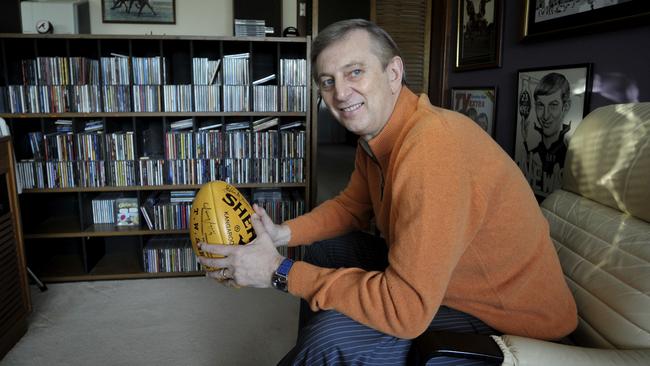
HM: What was the genesis of that line?
DC: The term “inch perfect” was a common one when I was growing up. All I did was go metric! It’s one that I just don’t get, but it’s the one that people seem to identify most with.
HM: Is it hard to respond when people yell that out at you?
DC: Well, there’s no topic. It’s a rather awkward moment, particularly when Vee’s around.
HM: You are a big reader, especially on JFK. Do you have a theory on who shot the president?
DC: Yes, but you don’t want to hear it, and I don’t think we have time, Hame! What I did do when I was at the ABC was prepare a documentary on it. The 25th anniversary was coming up, and I had spoken with a lot of the key figures with alternative opinions to the Warren Commission. I was intending to interview those guys, part of it was curiosity and part of it was getting a free trip to America. But the national competition came up and I left the ABC with the project hanging. I remember speaking with Channel 7’s sports director, Gary Fenton, and asking if I could finish my documentary. He told me the only John Kennedy I needed to worry about was the one coaching North Melbourne at the time! Now that’s a good line.
HM: Perhaps something you can now further investigate post football! You are an enormous consumer of music. Who would you most like to see in concert?
DC: I’m a Jackson Browne man but he’s one year older than me. So I’d go for War on Drugs or Father John Misty.
HM: You are a cool man. Running On Empty — mum ensured I grew up with Jackson Browne.
DC: He’s written a lot of good stuff. I did contact him a few years ago and suggested that he should get one of his concerts on to DVD before it was too late. I’ve followed him on vinyl, on cassette, and on CD. I had bought the same songs in every format, and I just wanted a concert. I actually got a reply, but I think it was from one of his “people”. The good news is he brought out a concert on high definition DVD last year.
HM: You are going to have some time on your hands soon. Is there a “bucket list” that you, Morgan Freeman and Jack Nicholson are going to tick off together?
DC: I don’t really know what the future holds, to be honest. I will probably potter around in the media in Perth but my travelling days are over. My bucket will not be exotic!
HM: I know a lot of swimmers that hardly get back in the water once they retire. Will you be able to watch the football and enjoy it, do you think?
DC: Yes, definitely. Although I’ll probably be as interested in the WAFL as the AFL. We are all the products of our memories. And something I’m left with these days is that in my mind’s eye, I have countless faces of young men in their prime. It can be eerie to meet old footballers years after they’ve retired.
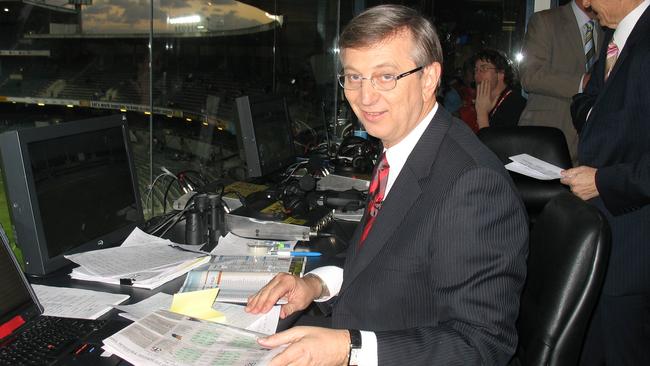
HM: When Seven commissions a telemovie based on your career, Jeff Goldblum will obviously have the part of Basil Zempilas stitched up. Who will play you?
DC: That’s a question I didn’t expect. Is Peter Tork still around? I hope he is, but because I’m not sure I’ll go with Owen Wilson — he’s got my hair. Goldblum is a lock — a perfect fit for Baz. I think I would get Matthew Goode to play you; every time I see him on TV I say to Vee how much you look like him. With Bruce … I think I will give Kevin Connolly the nod from Stephen Curry.
HM: Peter Tork — he is the one for you. Matthew Goode will only have a minor role but he’ll be chuffed to be in! What do you think has become more famous: your one-liners, your voice or your perfect hair?
DC: I’d hate to think it would be the hair or the one-liners. Mind you, I reckon we’re only about two or three hairstyles away from mine becoming the new thing. I’ve had it since the late ’60s.
HM: I heard someone describe your hair the other day as “presidential”.
DC: I’m okay with that!
HM: When you say your last words on Grand Final Day and take your headset off, what do you think the overriding emotions will be?
DC: Provided the day has gone reasonably well, I’d say a lot of relief. I will shake hands with Bruce as we usually do, I will say goodbye to the crew, and then I’ll just head back to my hotel, hopefully pleased and relieved.
HM: Den, yours is a Hall of Fame body of work. On behalf of the football viewer, and the broader sporting public, thank you for making watching sport an even more magical experience. We will miss you very much.
DC: Thanks, Hame. I am really looking forward to following the fortunes of all the guys I’ve worked with. I think that’s what I will miss the most: the camaraderie in the commentary box. It’s been a fun time, with some great people.
Dennis will call his last Game for Channel 7 on Saturday. Coverage begins at 9am.


